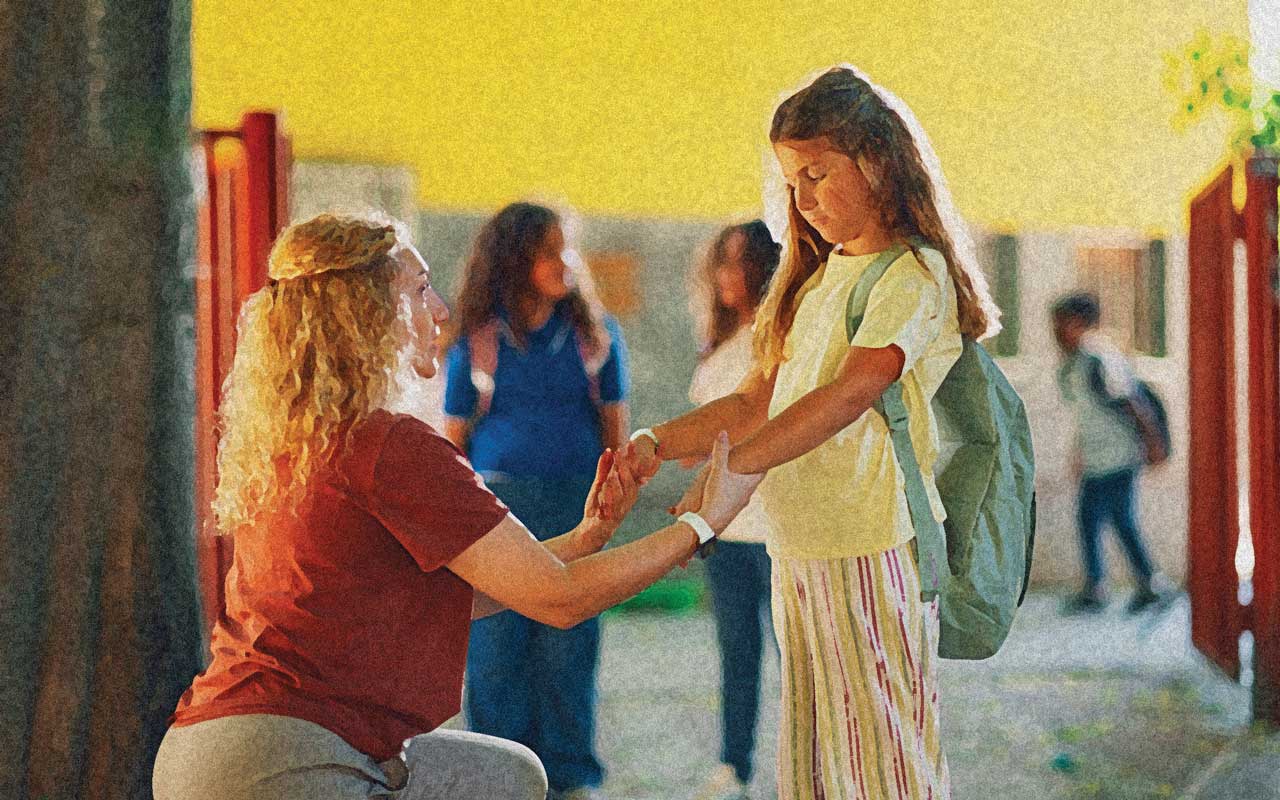Life lessons that build resilience can be hard for parents to watch. Elizabeth McKenzie had one of those moments last spring when her then-9-year-old daughter tried out for a competitive soccer team and didn’t make the cut. To make matters worse, her daughter’s three best friends all made the roster.
McKenzie remembers her daughter crestfallen and “spiraling,” with fast and furious predictions that her friends would attend practices together and get ice cream afterward and have sleepovers on game days—and that she would be left out. “In my head, I’m like, that’s all true,” says the Arlington mom of two.
Rather than attempting to distract her child from pain (or worse, petitioning the coach to reconsider), she listened. “I left a lot of space for her to share her thoughts with me,” says McKenzie, a parenting coach with Skill Builders, a speech-language and occupational therapy practice with offices in McLean, Alexandria and Annandale. “I said things like, ‘I can see why you’d be worried about that,’ or ‘That makes sense. I would be sad about that, too.’
“I also emphasized that feelings often shrink over time,” she says. “That even though she might still be disappointed a week from now, it won’t feel as sad as it does right this minute.”
In the days that followed, McKenzie and her husband, Evan, drew a clear line between empathy and coddling. Yes, their daughter was understandably sad and deserved to be comforted, but that didn’t give her a pass to behave badly. “She’s so upset because of this devastating thing,” McKenzie says, “so then she has kind of crappy behavior, right? She’s being really rude to her brother, and she’s demanding extra TV time and ice cream and just being kind of bratty.”
Those expressions of entitlement didn’t fly. “ ‘I’m still going to react the same way when you’re mean to your brother that I would on any other day,’ ” she told her daughter. “That’s what makes you a sturdy parent. Because you’re consistent. She needed me to be nice and sturdy so that she could spiral and then come back to center.”

In the world of parenting philosophies “sturdy parenting” occupies a middle ground between old-school authoritarianism and the overprotective, overly permissive parenting styles that arose in response to it.
A sturdy parent, McKenzie explains, is still an authority figure—not a friend—but a benevolent and approachable one who sets clear boundaries while validating a child’s feelings and striving to maintain a sense of connectedness.
The “sturdy” terminology was made popular by clinical psychologist and New York Times bestselling author Rebecca Kennedy, aka “Dr. Becky,” whose podcast, Good Inside with Dr. Becky, was named one of Apple Podcast’s Top Shows of 2021.
Every generation of new parents seeks to improve upon the perceived mistakes of their forebears. The strict Father Knows Best style of the mid-20th century gave way to the backseat approach of the ’70s and ’80s when latchkey kids were left to fend for themselves. Then helicopter parents touched down, intent on rectifying that neglect by overstimulating their children with emotional codependency, packed schedules and every kind of enrichment imaginable.
Another 21st century term, snowplow parenting, describes those inclined to clear every obstacle and potential pitfall from their child’s path to protect them from failure. The unintended consequence is that children deprived of the opportunity to manage certain tasks and social situations on their own may not develop healthy coping mechanisms and resilience.
Sturdy parenting empowers kids to make their own choices while setting clear and consistent guidelines about what parents will do in certain scenarios. This often eliminates the need for threats or punishment. For example, a parent might say, “I will not allow you to hit your sister, and if you do, you will be removed from the activity.” The focus is on the parent’s action (removing the child) rather than punishing the child for hitting.
Kennedy contends that kids don’t learn the right lessons from punishment. Take the example of the child whose iPad is taken away in response to an out-of-control moment. “Do you really think your 9-year-old is sitting there wondering [how they could have handled the situation better]?” she posed in a 2022 podcast episode. “No. They’re stewing in thoughts of revenge and in feeling misunderstood. None of that is effective.”
But consistency does require discipline on the parents’ part. Falls Church mom Marsea Nelson says she chooses her words carefully and is mindful of follow-through. “Before I say, ‘No, you can’t do that,’ I pause and think, Do I really mean that? Because if she pushes back and I say, ‘Oh, OK, I guess you can get back in the pool for five minutes’ then it’s giving a mixed message.”
Parenthood is a role Nelson takes very seriously: “My husband and I put a tremendous amount of intention into our parenting, in what we say, in what we do, in what she eats.”
Nelson read Kennedy’s first book, Good Inside, before her daughter was born and adopted the model as an alternative to the authoritarian home in which she was raised. “I grew up with a lot of shame, and that shame still is something I deal with at age 43,” she says. “I knew there was no room in my [own] family for shame.”

Nelson likes to joke that she “learned to parent via Instagram,” but it’s not entirely untrue. She counts among Kennedy’s 3.2 million Instagram followers and has visited the pop psychologist’s Good Inside website, which bills itself as a “24/7 parenting coach” for those with children 18 and under. She occasionally prints out select bits of wisdom and sticks them to her fridge.
Say your child is talking back because he doesn’t want to go to bed, Kennedy posits in one hypothetical scenario. It’s natural to want to snap back, “Don’t talk to me that way!” or “No iPad for a week!” And yet, these reactions only escalate the situation and leave a child even more dysregulated.
Rather than resorting to punishment, she instructs, say something like, “I know you are a good kid and I know you can say that again in a kinder way.” Rethinking consequences allows you to stay connected to your child and focus on why the behavior is occurring in the first place.
Kennedy’s advice is big on visualization. Imagine a garden full of benches, she tells her listeners, each representing a different feeling. Parents can perch on the less comfortable benches alongside their kids when they’re having those feelings. It’s a “sturdy” way of validating the emotion and helping the child learn to sit with it a while—in contrast to immediately trying to yank them onto the happy bench or otherwise invalidating the negative feeling.
Arlington psychologist Christina Tripodi Mitchell gives Kennedy a lot of credit for bringing what she calls “helpful, evidence-based strategies” into the public view. “There is a very solid backing to what it is that she’s purporting,” Mitchell says, noting a distinction between authoritarian and authoritative. The latter “really is just a clinical way of saying: Understand the whole child, and treat and respond to the whole child.”

Authoritative isn’t a bad word, she clarifies. In fact, a 2020 study of parenting styles across 10 countries, published in Children and Youth Services Review, found higher levels of life satisfaction in children raised by authoritative parents. The authoritative model is also associated with fewer depressive symptoms during adolescence, according to a 2010 study published in The Journal of Genetic Psychology. Kids who know the rules and are given the agency to make their own decisions within those guardrails develop confidence and are less likely to feel helpless.
Jessica Salen, a developmental psychologist with Temple Rodef Shalom’s Early Childhood Center in Falls Church, says the basic principles of sturdy parenting aren’t new. She recalls being in graduate school in the 1980s and studying the same fundamental concepts.
What is new is the repackaging of those concepts for how parents digest information in the digital age. “It can be hard to keep up with all the novel terms,” Salen says. “Many child-development experts are coining their own terminology for approaches that are very similar.”
Salen sees a lot of commonalities between “gentle” and “sturdy” parenting styles, both of which are rooted in the authoritative approach. (British childcare author Sarah Ockwell-Smith, who wrote The Gentle Parenting Book in 2021, has also said publicly that gentle parenting and authoritative parenting are essentially the same thing—but that social media has run wild with her terminology.)
McKenzie draws more of a distinction. Both approaches advocate empathy, respect and positive reinforcement, she says, but what’s missing from gentle parenting are boundaries and consequences for certain behaviors. She recalls parents who’ve read Ockwell-Smith’s book telling her they felt like failures because they had blown up at their kids and then felt bad about it.
With the advent of gentle parenting, “there was this big emphasis on validating our kids’ feelings all the time,” she says, which made parents feel like they had to bury their own feelings. “If you are a human with any kind of emotional response, you can’t do it. Gentle parenting is nice in a vacuum, but it’s not realistic.”
That’s where boundaries and structure come in. “Kids thrive when expectations are consistent and predictable,” she says. “So really, the happy medium is this sturdy parenting. You don’t need your parent to be your best friend. You need a lot of warmth and validation, of course, but also you need to know what your parents expect from you.”

Sturdy parenting doesn’t just focus on negative behaviors. Fern Andraos, a speech-language pathologist serving families in the D.C. area, says she especially appreciates the philosophy’s emphasis on having fun with your kids and connecting with them on a goofy level. It sounds simple but often gets lost in the day-to-day of scheduling and trying to do things the “right” way.
“Nobody needs a perfect parent. That’s not helpful,” says the Arlington mom of three and co-founder of Learning Through Love, a private pediatric speech-language therapy and parent coaching practice. “If you allow yourself to be present and join them in their joy and their fun and in their craziness, your nervous system is going to feel so much more grounded, and your kid is going to feel so connected with you.”
McKenzie similarly works to help moms and dads enjoy the experience of parenting as a way of sparking genuine connections with their children. She’s the co-founder of Backpocket, a series of card kits offering conversation starters and activities parents can do with their kids using little to no stuff. The card prompts are designed to take the mental load off adults who, for instance, may have just gotten home from work and want a quick and easy idea for connecting with their kids in the 30 minutes before dinner.
Nelson, the Falls Church mom, says her 3-year-old loves a game they call “Vomit Monster” using a long scarf they pretend is barf. Sometimes she asks to ride on her mom’s back like a horse.
Marian Hwang, a therapist based in Vienna, considers herself a highly intentional, sturdy parent. She made it a conscious choice after growing up in a strict household where emotions were not often expressed.
“It didn’t hit the mark in terms of what kind of parent I wanted to be,” she says of her upbringing. Hwang sometimes gives her therapy clients homework assignments that include listening to Kennedy’s podcast episodes.
The impulse for parents to label their style of child-rearing is relatively new. Child psychologist Mitchell believes it’s emblematic of modern-day overwhelm, which brings with it a desire to latch onto accessible guidance. Community support has not kept up as women have joined the workforce and American families have moved away from a multigenerational style of living.
In Western societies, she observes, the focus tends to be more on the baby shower and preparing for the baby’s arrival, whereas other cultures place more emphasis on helping parents with infants and young children. She says those mothers traditionally have better mental health outcomes.
“There is a sense of parents feeling like they are drowning,” Mitchell says. “We are in a society that doesn’t provide a lot of support for that, whether it be financial assistance for daycare or pre-K education or postpartum support.”
Salen says many of today’s parents strike her as anxious about their children. At school pick-up time, she overhears them using what she suspects are canned parenting scripts, “when really their child just wants to come and give them a big hug.”
“Sometimes I hear parents saying, ‘You’re having a big feeling,’ or labeling things. It literally sounds like it came out of AI or from a book,” she says. “The truth is, when a child is really upset, you just want to be there for them. It’s not the moment to bring in your script. I think it’s a little gimmicky.”
She says parents are so worried about raising their kids correctly that they think they need to follow an expert. “I know it’s because they want to get it right. So you feel for them.”
Mitchell cautions moms and dads against subscribing too rigidly to any one theory. Meeting a child’s needs is always more important than whatever is trending on social media. But she also sees parents whose basic intentions are good, and driven by love.
“This is all coming from a place of wanting to be better educated, better informed, and ultimately break some [negative] cycles,” she says. “That is remarkable. I don’t think we credit ourselves with that enough.”

Last year, McKenzie lost her father, Charlie Clark, a local historian, author and journalist, with whom she was very close. He was always a big music lover, she says, and wanted to share that love with his children.
One year, for her fifth-grade birthday party, he made a mixtape of songs featuring every party guest’s name. (He even checked the box for a friend named Taryn with NSYNC’s “Tearin’ Up My Heart.”)
“I remember feeling slightly nervous that my friends would think it was lame,” McKenzie says, “but instead, it was a smash hit. People talked about it for years to come.”
Though her dad’s death devastated her, it also prompted her to consider what had made their relationship so strong, and how she could foster the same kinds of bonds with her own kids. “I’m always thinking, how is this driving my long-term, lifelong connection with my children versus short-term problem-solving in the moment?” she says.
Yes, her daughter may roll her eyes when her mom holds her to certain expectations. And no, she may not like that the answer is “no” for ice cream at 9:30 p.m., even after a rough day. But she won’t feel lost at sea.
“In our long-term relationship, she knows what to expect from me,” says McKenzie. “And that she can count on me.”
Susan Anspach is a mom of three and a preschool educator living in Vienna.
